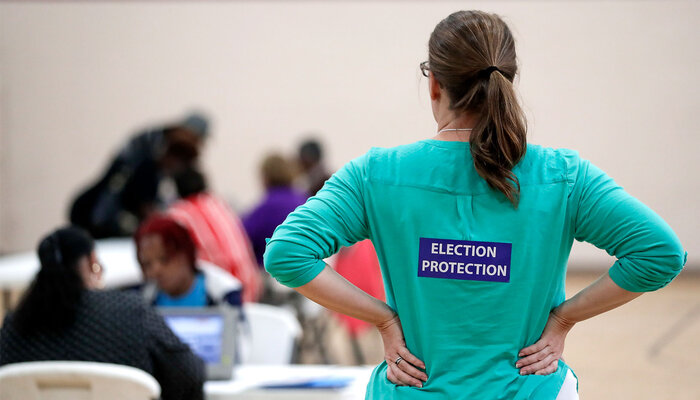Written and Published in Partnership with All Voting is Local
Election observers, referred to as “poll watchers” and “election challengers” in Michigan, are individuals who monitor polling places and ballot counting sites. While election observers play an important role in providing transparency, they can also be a potential source of disruption and intimidation. For this reason, all states have a series of rules and constraints regarding who can serve as election observers and what they can do. Michigan’s rules on observers, which derive both from the state’s election code and from guidance issued by the secretary of state, are:
Appointment
- Michigan allows for the formal appointment of “election challengers” as official poll watchers and permits any member of the public to observe the polls informally.
- Election challengers must be a registered Michigan voter and must be appointed and credentialed by a political party or qualified interest group.footnote1_UDxU4p6c937y0wmgms2h1289nwzWFqI4u4qK5Hc2Gk_huKz8f5XOnwo1 Mich. Comp. Laws § 168.730.
- At polling places and early voting sites, political parties and qualified interest groups are each allowed no more than two designated election challengers per precinct.footnote2_UDxU4p6c937y0wmgms2h1289nwzWFqI4u4qK5Hc2Gk_pjwTEJ9HIxND2 Mich. Comp. Laws § 168.730. Prior to Election Day, only one challenger per eight election inspectors is permitted during absentee voter ballot processing.footnote3_8xKbCGL7iIwoMxQfwV7rWzCVxpO-WmSE5LfxlNIwRA_yHmLJEQmz8xz3 Michigan Bureau of Elections, The Appointment, Rights, and Duties of Election Challengers and Poll Watchers, 8, September 2024, https://www.michigan.gov/sos/-/media/Project/Websites/sos/01vanderroest/SOS_ED_2_CHALLENGERS.pdf. On and after Election Day, the number of challengers permitted at an absentee voter ballot processing facility is determined by the clerk under guidance set forth by the secretary of state.footnote4_UDxU4p6c937y0wmgms2h1289nwzWFqI4u4qK5Hc2Gk_a600ODbSDueB4 Mich. Comp. Laws § 168.730.
- All election challengers must carry a “Michigan Challenger Credential Card” on a form prescribed by the secretary of state.footnote5_aRyQsMRDLzWL0trsuCGkqUCQAwA12RB1Ws2VsrcVhNc_tClzcuYyWoir5 MI Bureau of Elections, The Appointment, Rights, and Duties of Election Challengers and Poll Watchers, 4–5.
- As to poll watchers, Michigan law is silent. The secretary of state has said any member of the public (except candidates on the ballot) can be a poll watcher.footnote6_RSXdETZ1Mwhkb6z8blhjsEUsrOifoMwcVHRBetW5V7c_imwiczKvlsmb6 MI Bureau of Elections, The Appointment, Rights, and Duties of Election Challengers and Poll Watchers, 23.
- If the designated public viewing area is full and cannot be enlarged without disrupting election processes, the clerk may deny entry to more poll watchers.footnote7_6fOp8LQd5oSFXtIrRJB7GhYixyuNCyJjURAeRoU2NTw_lLu2dbaQRTQ57 MI Bureau of Elections, The Appointment, Rights, and Duties of Election Challengers and Poll Watchers, 23. The same is not true for election challengers.
- Both election challengers and poll watchers are required to swear an oath before observing at an absentee voter ballot processing facility.footnote8_UvBiCLiDIE2GfbtHXQhQUcrzVyw4TxYQWC2uz5x-2o_fJ4UiQH7qbuP8 MI Bureau of Elections, The Appointment, Rights, and Duties of Election Challengers and Poll Watchers, 8, 23.
Role of Election Challengers
- Election challengers observe the election process at a polling place, an early voting site, or an absent voter ballot processing facility.footnote9_fhSleb34Y9CI6959XSPaPiiuxk7Q76KgsWRREE4pfw_oz9jp5MJVFZD9 Mich. Comp. Law § 168.733(1); MI Bureau of Elections, The Appointment, Rights, and Duties of Election Challengers and Poll Watchers, 8.
- Election challengers must follow directions from election inspectors and must only communicate with the designated challenger liaison unless directed otherwise.footnote10_ILTYznN88k1HthuB8PM83SQyM4E4mT-STDIJZLGKbKA_waiRUASnJMTe10 MI Bureau of Elections, The Appointment, Rights, and Duties of Election Challengers and Poll Watchers, 4–6.
- Election challengers are permitted to view, but not touch, applications to vote, registration lists, and other printed election materials as long as doing so does not interfere with the voting process or an election inspector’s ability to perform their duties.footnote11_hfUMBQnQGv-ryEtI6dpCyWhrA9dy1Dm-49kUkqMlQkQ_bSG20o1xksmD11 MI Bureau of Elections, The Appointment, Rights, and Duties of Election Challengers and Poll Watchers, 20–21.
- Election challengers are allowed to challenge an election process, but the challenge “must state the specific element or elements of the process that the challenger believes are being improperly performed and the basis for the challenger’s belief.”footnote12_ZC9skqnfMM50jxzTsX9Qx6in4joZy0HeupYch-0BFcg_vcioXrHmM9IH12 Mich. Comp. Laws § 168.733(d); MI Bureau of Elections, The Appointment, Rights, and Duties of Election Challengers and Poll Watchers, 18. A challenge is impermissible if the challenger cannot explain why the challenged process is being performed in a manner prohibited under state law.footnote13_Q9XOaeK8sS26KO6EOGOh0QpyvNkJjzWqMJingu-8M_lGau3k1nFfDx13 MI Bureau of Elections, The Appointment, Rights, and Duties of Election Challengers and Poll Watchers, 18.
- Election challengers may challenge a voter’s eligibility to vote.footnote14_xTP4s5nKb5Fbb57hY20gdAGS6ETNggDKeqLsDn8Jk_eviZ2vcRkgGo14 Mich. Comp. Laws §§ 168.727. More information on the rules and constraints on voter eligibility challenges can be found here.
Role of Poll Watchers
- Poll watchers monitor the election process from a designated public viewing area at a polling place, an early voting site, or an absentee voter ballot processing facility.footnote15_TOfTocxQlkldIrVb8PSMVRQ9Y9qQYKsHZFfoKjhwGAc_c8DXGtifA7Rv15 MI Bureau of Elections, The Appointment, Rights, and Duties of Election Challengers and Poll Watchers, 23. They are bound by the same restrictions as election challengers but play a more limited role.footnote16_UjyVpZ0yAMvq4MBO4cRH51HjFsToDpKM1v2l2LYKzo_xepRNGAb0LDv16 MI Bureau of Elections, The Appointment, Rights, and Duties of Election Challengers and Poll Watchers, 23–24.
- Poll watchers must follow directions from election inspectors and must only communicate with the designated challenger liaison unless directed otherwise.footnote17_Nen973wfGzZxuSzVQQNUcpcdb5p7P2NmSFkjYTKHQjY_p7TjIjt3zXD217 MI Bureau of Elections, The Appointment, Rights, and Duties of Election Challengers and Poll Watchers, 24.
- The challenger liaison may allow watchers to look at but not touch the poll book and other election materials, as long as they do not delay the voting process.footnote18_wKCn2-C42rQt1nGtoWCVYsk74bnxL69eK2AK2qykCQ_rlmDno8IIbqp18 MI Bureau of Elections, The Appointment, Rights, and Duties of Election Challengers and Poll Watchers, 23.
- Unlike election challengers, poll watchers do not have the right to challenge a person’s eligibility to vote.footnote19_MMjpdPU2Sj8qaMbwZOvank6fETAKqXwz0repc1nxyo4_phwiaqW6Qw0e19 Mich. Comp. Laws § 168.727; MI Bureau of Elections, The Appointment, Rights, and Duties of Election Challengers and Poll Watchers, 24.
Prohibited Activities
- Electioneering: It is illegal for anyone, including poll watchers and election challengers, to campaign within 100 feet of any building entrance used by voters to enter a polling place.footnote20_te8OIL0CILsud0kxclef3JughZ0Uc14MvVfViB7bOI_g3ED0LHeTEug20 Mich. Comp. Laws §§ 168.744, 168.931(1)(j). This includes a ban on wearing clothing or other paraphernalia with messaging relating to a party, candidate, or proposition on the ballot.footnote21_h4kYjhFd7IYugUAYtolsd3E85BA98V920H3vUv6au0_q0SpH64Gvyyx21 MI Bureau of Elections, The Appointment, Rights, and Duties of Election Challengers and Poll Watchers, 21, 24.
- Voter Intimidation: Michigan law explicitly makes it a crime for anyone, including poll watchers, to threaten or intimidate voters.footnote22_8vY8PjDGSDAuOClnD1GkqmV92RtG-5sNGElE4RKJJxE_pFfn3qm3yyJs22 Mich. Comp. Laws § 168.932(a), (d).
- Disrupting the Voting Process: Poll watchers and election challengers cannot disrupt or interfere with voting, ballot counting, or any other election process.footnote23_BJfB7n8JI7rMVmgLTc5zoEOH3xQ0x5gVkHu7AMZTbI_aPmc4KIOMb3e23 MI Bureau of Elections, The Appointment, Rights, and Duties of Election Challengers and Poll Watchers, 21, 24.
- Taking Photos, Videos, or Audio Recordings: Poll watchers and election challengers cannot take videos or photos in the polling place or clerk’s office.footnote24_irFDG2k3g9SdUZlpujMTF6lvunmctE5t8jGgElmz2Ls_yiolarrRz0W724 MI Bureau of Elections, The Appointment, Rights, and Duties of Election Challengers and Poll Watchers, 21, 24. At absentee voter ballot processing facilities, both poll watchers and election challengers may not record video or audio.footnote25_SnT8xE0qJgAINdh3S3Q1pyPeNBMyr3wtyXRXcnKCnk_lULskfNCarfP25 Michigan Bureau of Elections, Election Officials’ Manual, Chapter 8: Absent Voter Ballot Processing, 3, September 2024, https://www.michigan.gov/sos/-/media/Project/Websites/sos/01mcalpine/Absent-Voter-Ballot-Processing.pdf.
- Speaking to Voters: Poll watchers and election challengers cannot approach and question, or offer assistance to voters.footnote26_1WZdBmUKn4ZroGRmW5feH3422Z0Lsa-aUzJO2NNz6M_sfOGjVtyG4x226 MI Bureau of Elections, The Appointment, Rights, and Duties of Election Challengers and Poll Watchers, 21, 24.
Federal and state law strictly prohibit all people, including observers, from engaging in voter intimidation. Any action that makes a voter feel intimidated, threatened, or coerced (including any effort to prevent a voter from registering to vote, voting, or voting for or against any candidate or ballot measure) could constitute voter intimidation, regardless of whether it breaks a specific rule.footnote27_YP-FQJ4DE4wcNxH8zW8B5EO3zk6efxDvFnUmt0qa-8_dGgbf7JMmkQ827 Mich. Comp. Laws § 168.932(a), (d); 18 U.S.C. §§ 241, 594; 52 U.S.C. § 10101(b). More information on the federal and state laws that protect Michigan voters from intimidation can be found here.
Removal
- Election inspectors have authority to remove poll watchers if they break the rules, fail to follow instructions, disrupt the polling place, or threaten or intimidate a voter or election worker.footnote28_6qhsEfnIdUVnOXxK3vKvWZTZ63YR5HF-hGxdIAmfjM_yRkjyew2jZ9128 MI Bureau of Elections, The Appointment, Rights, and Duties of Election Challengers and Poll Watchers, 24.
- Election inspectors must warn any election challenger who takes a prohibited action or fails to follow directions from an election inspector, unless the prohibited action is so egregious that the challenger needs to be immediately ejected.footnote29_ZdLMIVH2qSbMTW50cPpJIg2Q19KhDFBWubwh5r5XoDg_hcXZL4avsKUt29 MI Bureau of Elections, The Appointment, Rights, and Duties of Election Challengers and Poll Watchers, 21–22. Inspectors may also eject challengers who repeatedly act in prohibited manners or fail to follow directions.footnote30_D0pqQYQqRewFBbVJLVM3rfwIK5Cbj-N8joAy3zp4km0_vhBIJICb5kVE30 MI Bureau of Elections, The Appointment, Rights, and Duties of Election Challengers and Poll Watchers, 22.
- If an ejected poll watcher or election challenger refuses to leave, the poll worker may request the assistance of law enforcement to remove them.footnote31_RkLsF75odMxwutXnWdhmngJZpGU-1QnvOvau6Kr6Hg_iiv4SWlxp5gs31 MI Bureau of Elections, The Appointment, Rights, and Duties of Election Challengers and Poll Watchers, 22, 24.
- Any poll watcher or election challenger who engages in prohibited activities may also face criminal charges.footnote32_Juwz0XIHr0ZNrqxr5dmfsjkCCTRhztAkaF6MZT9wZs_spEBpC8OCuS832 Mich. Comp. Laws §§ 168.744; 168.932(a), (d).
End Notes
-
footnote1_UDxU4p6c937y0wmgms2h1289nwzWFqI4u4qK5Hc2Gk_huKz8f5XOnwo
1
Mich. Comp. Laws § 168.730.
-
footnote2_UDxU4p6c937y0wmgms2h1289nwzWFqI4u4qK5Hc2Gk_pjwTEJ9HIxND
2
Mich. Comp. Laws § 168.730.
-
footnote3_8xKbCGL7iIwoMxQfwV7rWzCVxpO-WmSE5LfxlNIwRA_yHmLJEQmz8xz
3
Michigan Bureau of Elections, The Appointment, Rights, and Duties of Election Challengers and Poll Watchers, 8, September 2024, https://www.michigan.gov/sos/-/media/Project/Websites/sos/01vanderroest/SOS_ED_2_CHALLENGERS.pdf.
-
footnote4_UDxU4p6c937y0wmgms2h1289nwzWFqI4u4qK5Hc2Gk_a600ODbSDueB
4
Mich. Comp. Laws § 168.730.
-
footnote5_aRyQsMRDLzWL0trsuCGkqUCQAwA12RB1Ws2VsrcVhNc_tClzcuYyWoir
5
MI Bureau of Elections, The Appointment, Rights, and Duties of Election Challengers and Poll Watchers, 4–5.
-
footnote6_RSXdETZ1Mwhkb6z8blhjsEUsrOifoMwcVHRBetW5V7c_imwiczKvlsmb
6
MI Bureau of Elections, The Appointment, Rights, and Duties of Election Challengers and Poll Watchers, 23.
-
footnote7_6fOp8LQd5oSFXtIrRJB7GhYixyuNCyJjURAeRoU2NTw_lLu2dbaQRTQ5
7
MI Bureau of Elections, The Appointment, Rights, and Duties of Election Challengers and Poll Watchers, 23.
-
footnote8_UvBiCLiDIE2GfbtHXQhQUcrzVyw4TxYQWC2uz5x-2o_fJ4UiQH7qbuP
8
MI Bureau of Elections, The Appointment, Rights, and Duties of Election Challengers and Poll Watchers, 8, 23.
-
footnote9_fhSleb34Y9CI6959XSPaPiiuxk7Q76KgsWRREE4pfw_oz9jp5MJVFZD
9
Mich. Comp. Law § 168.733(1); MI Bureau of Elections, The Appointment, Rights, and Duties of Election Challengers and Poll Watchers, 8.
-
footnote10_ILTYznN88k1HthuB8PM83SQyM4E4mT-STDIJZLGKbKA_waiRUASnJMTe
10
MI Bureau of Elections, The Appointment, Rights, and Duties of Election Challengers and Poll Watchers, 4–6.
-
footnote11_hfUMBQnQGv-ryEtI6dpCyWhrA9dy1Dm-49kUkqMlQkQ_bSG20o1xksmD
11
MI Bureau of Elections, The Appointment, Rights, and Duties of Election Challengers and Poll Watchers, 20–21.
-
footnote12_ZC9skqnfMM50jxzTsX9Qx6in4joZy0HeupYch-0BFcg_vcioXrHmM9IH
12
Mich. Comp. Laws § 168.733(d); MI Bureau of Elections, The Appointment, Rights, and Duties of Election Challengers and Poll Watchers, 18.
-
footnote13_Q9XOaeK8sS26KO6EOGOh0QpyvNkJjzWqMJingu-8M_lGau3k1nFfDx
13
MI Bureau of Elections, The Appointment, Rights, and Duties of Election Challengers and Poll Watchers, 18.
-
footnote14_xTP4s5nKb5Fbb57hY20gdAGS6ETNggDKeqLsDn8Jk_eviZ2vcRkgGo
14
Mich. Comp. Laws §§ 168.727.
-
footnote15_TOfTocxQlkldIrVb8PSMVRQ9Y9qQYKsHZFfoKjhwGAc_c8DXGtifA7Rv
15
MI Bureau of Elections, The Appointment, Rights, and Duties of Election Challengers and Poll Watchers, 23.
-
footnote16_UjyVpZ0yAMvq4MBO4cRH51HjFsToDpKM1v2l2LYKzo_xepRNGAb0LDv
16
MI Bureau of Elections, The Appointment, Rights, and Duties of Election Challengers and Poll Watchers, 23–24.
-
footnote17_Nen973wfGzZxuSzVQQNUcpcdb5p7P2NmSFkjYTKHQjY_p7TjIjt3zXD2
17
MI Bureau of Elections, The Appointment, Rights, and Duties of Election Challengers and Poll Watchers, 24.
-
footnote18_wKCn2-C42rQt1nGtoWCVYsk74bnxL69eK2AK2qykCQ_rlmDno8IIbqp
18
MI Bureau of Elections, The Appointment, Rights, and Duties of Election Challengers and Poll Watchers, 23.
-
footnote19_MMjpdPU2Sj8qaMbwZOvank6fETAKqXwz0repc1nxyo4_phwiaqW6Qw0e
19
Mich. Comp. Laws § 168.727; MI Bureau of Elections, The Appointment, Rights, and Duties of Election Challengers and Poll Watchers, 24.
-
footnote20_te8OIL0CILsud0kxclef3JughZ0Uc14MvVfViB7bOI_g3ED0LHeTEug
20
Mich. Comp. Laws §§ 168.744, 168.931(1)(j).
-
footnote21_h4kYjhFd7IYugUAYtolsd3E85BA98V920H3vUv6au0_q0SpH64Gvyyx
21
MI Bureau of Elections, The Appointment, Rights, and Duties of Election Challengers and Poll Watchers, 21, 24.
-
footnote22_8vY8PjDGSDAuOClnD1GkqmV92RtG-5sNGElE4RKJJxE_pFfn3qm3yyJs
22
Mich. Comp. Laws § 168.932(a), (d).
-
footnote23_BJfB7n8JI7rMVmgLTc5zoEOH3xQ0x5gVkHu7AMZTbI_aPmc4KIOMb3e
23
MI Bureau of Elections, The Appointment, Rights, and Duties of Election Challengers and Poll Watchers, 21, 24.
-
footnote24_irFDG2k3g9SdUZlpujMTF6lvunmctE5t8jGgElmz2Ls_yiolarrRz0W7
24
MI Bureau of Elections, The Appointment, Rights, and Duties of Election Challengers and Poll Watchers, 21, 24.
-
footnote25_SnT8xE0qJgAINdh3S3Q1pyPeNBMyr3wtyXRXcnKCnk_lULskfNCarfP
25
Michigan Bureau of Elections, Election Officials’ Manual, Chapter 8: Absent Voter Ballot Processing, 3, September 2024, https://www.michigan.gov/sos/-/media/Project/Websites/sos/01mcalpine/Absent-Voter-Ballot-Processing.pdf.
-
footnote26_1WZdBmUKn4ZroGRmW5feH3422Z0Lsa-aUzJO2NNz6M_sfOGjVtyG4x2
26
MI Bureau of Elections, The Appointment, Rights, and Duties of Election Challengers and Poll Watchers, 21, 24.
-
footnote27_YP-FQJ4DE4wcNxH8zW8B5EO3zk6efxDvFnUmt0qa-8_dGgbf7JMmkQ8
27
Mich. Comp. Laws § 168.932(a), (d); 18 U.S.C. §§ 241, 594; 52 U.S.C. § 10101(b).
-
footnote28_6qhsEfnIdUVnOXxK3vKvWZTZ63YR5HF-hGxdIAmfjM_yRkjyew2jZ91
28
MI Bureau of Elections, The Appointment, Rights, and Duties of Election Challengers and Poll Watchers, 24.
-
footnote29_ZdLMIVH2qSbMTW50cPpJIg2Q19KhDFBWubwh5r5XoDg_hcXZL4avsKUt
29
MI Bureau of Elections, The Appointment, Rights, and Duties of Election Challengers and Poll Watchers, 21–22.
-
footnote30_D0pqQYQqRewFBbVJLVM3rfwIK5Cbj-N8joAy3zp4km0_vhBIJICb5kVE
30
MI Bureau of Elections, The Appointment, Rights, and Duties of Election Challengers and Poll Watchers, 22.
-
footnote31_RkLsF75odMxwutXnWdhmngJZpGU-1QnvOvau6Kr6Hg_iiv4SWlxp5gs
31
MI Bureau of Elections, The Appointment, Rights, and Duties of Election Challengers and Poll Watchers, 22, 24.
-
footnote32_Juwz0XIHr0ZNrqxr5dmfsjkCCTRhztAkaF6MZT9wZs_spEBpC8OCuS8
32
Mich. Comp. Laws §§ 168.744; 168.932(a), (d).





